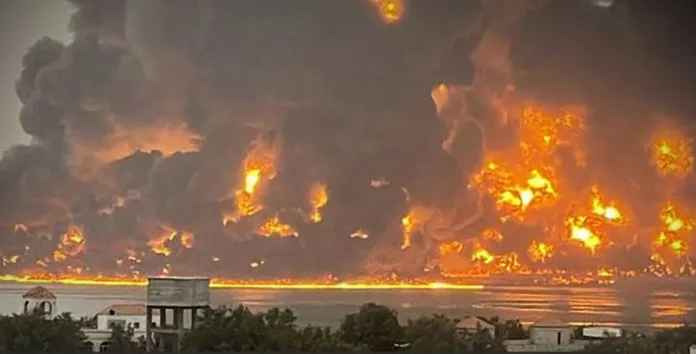The recent escalation in the longstanding Israeli-Palestinian conflict has taken a concerning turn with the introduction of missile fire reaching Tel Aviv from non-traditional fronts. The Houthis in Yemen have claimed responsibility for a ballistic missile attack, dubbed ‘Palestine 2’, highlighting the expanding reach of hostilities that now span beyond the immediate geographical boundaries of Israel and Palestine.
This incident is not simply an isolated military exchange but rather part of a broader network of alliances and shared grievances in the Middle East. The conflict has historically been characterized by cycles of violent escalation and fragile ceasefires, both of which have had profound impacts on civilian popula tions across the Israeli and Palestinian territories.
Israel’s response, typically swift and decisive, has involved airstrikes in the Gaza Strip, leading to a tragic toll on civilian lives, including women and children. This pattern of military retaliation raises alarms within the international com munity, emphasizing the urgent need for a diplomatic solution. Renewed calls for human rights protection have been amplified by organizations like Doctors Without Borders and Human Rights Watch, who have reported possible acts of ethnic cleansing within the Gaza Strip.
The involvement of other regional actors, such as the Houthis’ missile attack, underscores the potential for the conflict to draw in additional third parties, each with their vested interests and affiliations. Yemen’s Houthi rebels, backed in part by Iran, have publicly aligned themselves with Palestinian struggles, further complicating an already intricate geopolitics scenario.
The ramifications of this escalation are manifold. On one side, it aggravates an already volatile region with the potential for broader confrontation drawing in nations from the Arabian Peninsula to North Africa. On the other, it reflects the frustrations of underrepresented groups who leverage alliances across borders to amplify their causes. Global superpowers have traditionally played significant roles in brokering peace or escalating tensions, with often profound ripple effects on international relations strategies.
These developments come amid a broader context of shifting alliances and strate gic recalibrations in the Middle East. As regional powers vie for influence, the Israeli-Palestinian conflict remains a pivot around which many other security and political strategies turn. Consequently, the international community is pressed to reassess its roles and responses, balancing moral responsibilities with geopolitical interests in one of the world’s most complex and enduring conflicts.
Perspectives
• Perspective 1: International human rights organizations such as Amnesty International and Human Rights Watch have expressed deep concern over the loss of civilian lives and the potential for war crimes in the region. They argue for immediate humanitarian intervention and call for all parties to abide by international laws governing armed conflicts. These organizations emphasize a need for a ceasefire and the re-engagement of peace processes that prioritize human rights and ensure accountability for violations.
Sources:
• Perspective 2: Israeli government officials and supporters, as reported in Israeli publications such as The Jerusalem Post and Haaretz, maintain that their defensive actions are necessary to protect their citizens from foreign aggressions. They highlight the security threats posed by militant groups and argue that the focus should be on disarming hostile entities to ensure long-term peace and stability in the region. Israeli authorities stress the importance of international cooperation to address what they see as fundamental security threats.
Sources:
• Perspective 3: Palestinian representatives and Arab nations, particularly those affiliated with the Arab League, see the recent hostilities as a continuation of long-standing grievances over territorial occupation and human rights abuses. Articles in Al Jazeera and The Arab News frame the conflict within the broader context of resistance against occupation, stressing the need for an internationally recognized Palestinian state as a prerequisite for any sustainable peace in the region. They condemn the use of heavy military retaliations that exacerbate humanitarian crises.
Sources:
